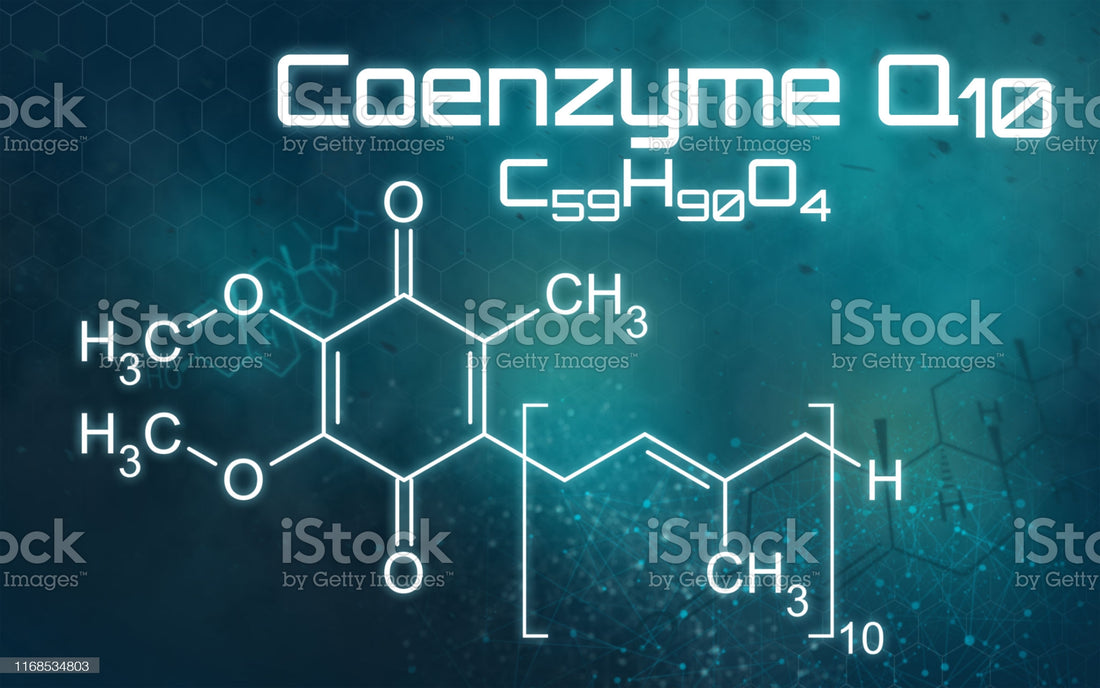A Better CoQ10
New food-grade CoQ10 generates 9 times better absorption than traditional
Coenzyme Q10, aka CoQ10, is among the most commonly known and popular supplements in the United States and with good reason. This fat-soluble nutrient is produced naturally by the body and is used by every cell in the body to create energy. It has a significant body of research detailing its efficacy and safety for its importance to the support of healthy heart function, muscle maintenance and energy production.
So why take a CoQ10 supplement if your body already produces the molecule? We know that CoQ10 has a big job—it is important for the synthesis of ATP (adenosine triphosphate), which is responsible for converting nutrients from food into fuel, and it is important for protecting the body from free radical damage. However, the production of CoQ10 declines with age and use of certain drugs, leaving us more susceptible to the effects of aging and chronic health conditions.
Getting enough CoQ10 from diet alone is also difficult, so it is important to replenish our CoQ10 stores with supplements as we get older. This is especially critical for people taking statins, a common cholesterol lowering drug which is now known, to decrease CoQ10 production and may be associated with side effects like myopathy. But it is also important for anyone looking to enhance their energy levels and ease recovery after sporting activities.
The important thing to remember is that CoQ10 bioavailability or absorption is important and can be vastly different from one CoQ10 product to another. There is much debate about which forms and what dosages are best. What we do know is that if enough CoQ10 does not get absorbed and reach the blood, a supplement will have little effect.
There are actually two forms of CoQ10, the oxidized form called ubiquinone, which was the first available form, and the reduced form, ubiquinol, which became available in 2007. The forms have distinct functions in the body: Ubiquinone is the essential form that the body cannot survive without. But they act as redox pairs that can recycle each other as needed. So, for example, ubiquinol can step in to maintain ubiquinone levels and serve as a defense system along with other antioxidants to protect the body from the free radicals and super-oxides that can cause the effects of aging.[1]
Most researchers believe the forms are interchangeable and either form can be taken as a supplement, although there is some evidence that ubiquinol may be more bioavailable than ubiquinone.[2],[3],[4] The use of CoQ10 in its reduced form, ubiquinol, has seen growing evidence for its support of intense exercise in athletes, to improve athletic performance and recovery of elderly athletes.[5],[6]
But now there is a new food-grade formulation of CoQ10 called CoQ10 phytosome that could be a game changer. It that has shown enhanced absorption as much as nine times higher than conventional CoQ10 extracts. In a 2019 solubility study, this CoQ10 phytosome called Ubiqsome®, a patent-pending ingredient from Indena, showed evidence of amelioration of CoQ10 muscle absorption after oral administration, and it is the only formula on the market that enhanced both plasmatic and muscle CoQ10 levels.[7]

The study demonstrated that Ubiqsome enhanced plasmatic levels of CoQ10 after administration of a single dose versus unformulated CoQ10 on a three-fold weight basis and a nine fold molar basis. (Source: Petrangolini G et al. A New Food-grade Coenzyme Q10 formulation improves bioavailability: Single and repeated Pharmacokinetic Studies in Healthy Volunteers. Current Drug Delivery. 2019.
The study noted that two different repeated doses of ubiqsome were effective (150 mg and 300mg), with both enhancing plasmatic levels of CoQ10 after administration for two weeks.

Red: Ubiqsome 150 mg (cont 30 mg CoQ10)
Green: Ubiqsome 300 mg (cont.50 mg CoQ10)
Source: Petrangolini G et al. A New Food-grade Coenzyme Q10 formulation improves bioavailability: Single and repeated Pharmacokinetic Studies in Healthy Volunteers. Current Drug Delivery. 2019.
Another intriguing first-time finding for UBIQSOME is that the phytosome improved muscle levels of CoQ10 after oral administration as demonstrated with two different analytical methods.

Source: Indena manuscript in submission. Data were presented at Vitafoods Europe 2019.
In a second study by Indena now under review, the ingredient has also proven effective for specific applications such as optimizing plasma antioxidant response before and after sports training as well as reducing release of pro-inflammatory cytokines following sporting activity.[8]
Clearly, ubiqsome is a versatile and effective ingredient that goes beyond any other CoQ10 in bioavailability. It also demonstrates that the administration of CoQ10 as ubiquinol is not necessary to get a pharmacokinetic and biological advantage, given the fact that CoQ10 as ubiquinone is converted anyway. The ingredient will likely usher in a new generation of CoQ10 products on the market.
One of the first to market is Princeton Vitamins’ CoQ10 with 300 mg of Ubiqsome, the dosage recommended for the maximum benefit as demonstrated in the research shown here. It is an ideal CoQ10 supplement for anyone looking to support their heart and muscle function as well as enhance energy production.*
Be well,
Mohamed Rafi, Ph.D., founder of Princeton Vitamins
*These statements have not been evaluated by the Food and Drug Administration. This product is not intended to diagnose, treat, cure, or prevent any disease.
[1] Miles MV, et al. Bioequivalence of coenzyme Q10 from over-the-counter supplements. Nutr Res. 2002:22(8);919-929
[2] Evans M et al. A randomized double-blind trial on the bioavailability of two CoQ10 formulations. Journal of Functional Foods. 2009. 1:65-73.
[3]Bhagavan HN t al. Plasma coenzyme Q10 response to oral ingestion of coenzyme Q10 formulations. Mitochondrion. 2007 Jun;7 Suppl:S78-S88.
[4] Shea A. Ubiquinol CoQ10: What it is and why it matters. https://ubiquinol.org/ubiquinol-coq10-supplement-facts
[5] Orlando P et al. Effect of ubiquinol supplementation on biochemical and oxidative stress indexes after intense exercise in young athletes. Redox Rep. 2018. 23(1); 136-145.
[6] Del Pozo-Cruz J et al. Relationship between functional capacity and body mass index with plazma Coenzyme Q 10 and oxidative damage in community-dwelling elderly people. Exp. Gerontol.2014.52;46-54.
[7] Petrangolini G et al. A new food-grade Coenzyme Q10 formulation improves bioavailability; Single and repeated Pharmacokinetic Studies in Healthy Volunteers. Current Drug Delivery. 2019.
[8] Indena manuscript in submission. Data were presented at Vitafoods Europe 2019.

